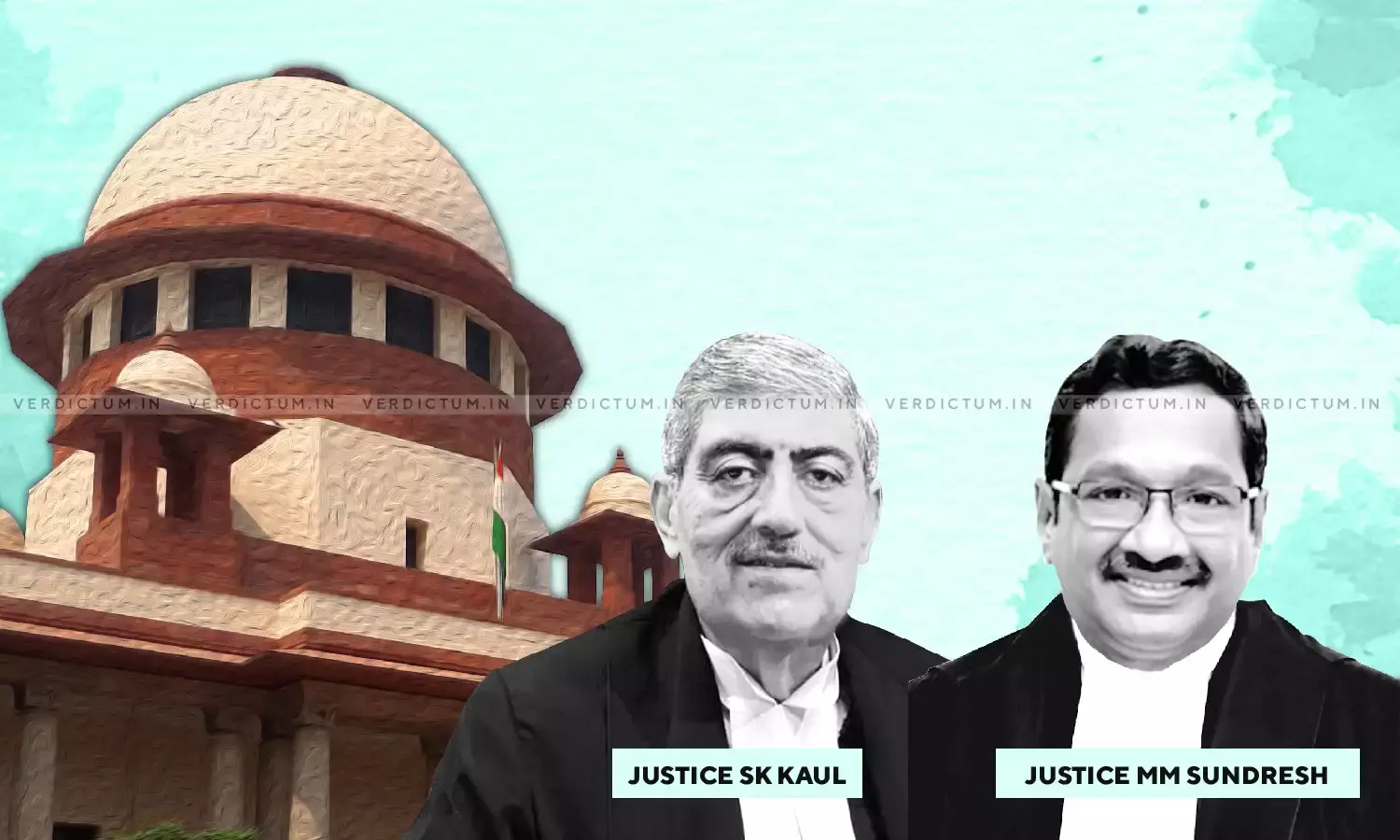Recovery U/s. 27 Of Evidence Act Must Satisfy Court's Conscience Regarding Credibility Of Witness – Supreme Court

A two-judge Bench of Justice SK Kaul and Justice MM Sundresh has held that any recovery made under Section 27 of the Evidence Act will have to satisfy Court's conscience as the Prosecution may take advantage of the custody of the accused by other means.
The Court also held that the Court will have to be conscious of the witness's credibility and other evidence produced when dealing with a recovery under Section 27 of the Evidence Act.
Senior Counsel Mr. R. Basant appeared for A-10 to A-13 before the Apex Court.
In this case, the deceased and the accused belonged to two different political parties CPI (M) and National Development Front (NDF). All the 16 accused were charged with the offences under Sections 120-B, 143, 147, 148, 427, 460, and 302 read with 149 IPC and Sections 3 and 5 of the Explosives Substances Act.
The Additional District and Sessions Judge, Kollam acquitted A-10 to A-16 and convicted the rest.
Appeals and revisions were filed by the Prosecution and de facto Complainant on one hand and the accused on the other. The Kerala High Court upheld the conviction of A-2, A-4, A-5, A-8, and A-9 for offences under Sections 460, 148, 302 read with 149 IPC and further convicted them under Section 427 IPC and Section 3 of the Explosives Substances Act.
The appeal filed by the State against the order of acquittal of A-14 to A-16 was dismissed, however, it was allowed by overturning the acquittal of A-10 to A-13. As the conviction of A-14 to A-16 attained finality, the accused preferred appeals before the Supreme Court.
i) Appeal against Acquittal
The Bench in this context noted that while dealing with an appeal against acquittal under Section 378 CrPC, the Appellate Court has to consider whether the Trial Court's view could be termed as a possible one especially when evidence on record has been analyzed.
The Court further added that in an order of acquittal the presumption of innocence lies in favor of the accused. Thus, the Appellate Court has to be slow in reversing the order of the Trial Court rendering acquittal.
The Bench in this context opined –
"Therefore, the presumption in favour of the accused does not get weakened but only strengthened. Such a double presumption that enures in favour of the accused has to be disturbed only by thorough scrutiny on the accepted legal parameters."
ii) Mere delay in forwarding the FIR to Magistrate cannot reject the Prosecution's case
The Court held that FIR is a vital and valuable aspect of evidence to corroborate the oral evidence. Hence, it is imperative that such information is expected to reach the jurisdictional Magistrate at the earliest point in time.
The Bench also noted –
"However, a mere delay by itself cannot be a sole factor in rejecting the prosecution's case arrived at after due investigation. Ultimately, it is for the Court concerned to take a call. Such a view is expected to be taken after considering the relevant materials."
iii) Investigating Report must be sent to Magistrate at the earliest, long delay would lead to suspicion
The Court observed that the IO is expected to kick start his investigation immediately after the registration of a cognizable offence. An inordinate and unexplained delay may be fatal to the Prosecution's case but only to be considered by the Court, on the facts of each case.
In this context, the Court noted –
"There may be adequate circumstances for not examining a witness at an appropriate time. However, non-examination of the witness despite being available may call for an explanation from the Investigating Officer. It only causes doubt in the mind of the Court, which is required to be cleared."
The Bench further held that a statement recorded under Section 161 CrPC, the investigating report must be sent to the jurisdictional Magistrate at the earliest. A long, unexplained delay would give room for suspicion.
iv) Recovery made under Section 27 of the Evidence Act
The Bench held that it is for the Prosecution to prove that the information received from the accused is relatable to the fact discovered.
Further, the Court held –
"The onus is on the prosecution to prove the fact discovered from the information obtained from the accused. This is also for the reason that the information has been obtained while the accused is still in the custody of the police. Having understood the aforesaid object behind the provision, any recovery under Section 27 will have to satisfy the Court's conscience. One cannot lose sight of the fact that the prosecution may at times take advantage of the custody of the accused, by other means. The Court will have to be conscious of the witness's credibility and the other evidence produced when dealing with a recovery under Section 27 of the Evidence Act."
v) Analysis of Case on Merits
The Court first took the case of the accused who was convicted by the Trial Court and the High Court. The Bench held that the Courts have dealt with all the contentions thoroughly in this regard.
The Bench also noted that merely because the witnesses were family members apart from being chance witnesses, their testimonies cannot be rejected.
The Court thus held that the evidence with regards to A2, A4, A5, A8, and A9 must be approved and both the Courts have considered the entire evidence available in drawing their conclusion, hence Appeals filed by the above accused were dismissed by the Apex Court.
The Apex Court further set aside the conviction of A10 to A13 and allowed their appeals and restored their acquittal as rendered by the Trial Court.
Click here to read/download the Judgment

